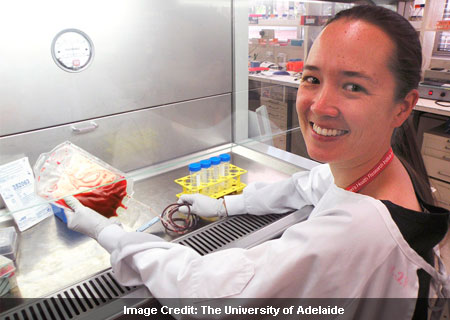Our immune system is extremely vital to the body. This news may provide significant insights about the immune system. Researchers from Adelaide are conducting a research to find out why some people are more prone to developing Crohn’s disease, ulcerative colitis and other autoimmune diseases.
A crucial disproportion of the regulatory cells necessary to manage the immune system has apparently been exposed among individuals with inflammatory bowel disease.
Pathology researcher Dr Nicola Eastaff-Leung is of the opinion that people with Crohn’s disease and ulcerative colitis seem to posses lesser numbers of regulatory cells and more ‘attack’ cells that could be the reason for inflammation.
Dr Eastaff-Leung commented, “All the food that we eat is foreign to our body. In healthy people the immune system has a mechanism to tolerate these foods and not react. But some people do not have enough of these regulatory cells and their body overreacts and goes into attack mode. That is where the inflammation occurs.â€
Dr Eastaff-Leung mentioned that outcomes of her lately finished PhD at the University of Adelaide could assist in presenting a diagnostic instrument for gastrointestinal diseases, thereby decreasing the requirement for colonoscopies in future.
She remarked, “If we can establish that all people suffering Crohn’s disease and ulcerative colitis have an imbalance of these regulatory cells, we may be able to develop a blood test that confirms suspected cases of these diseases. The second, bigger challenge is to work out a treatment that can restore the balance of these cells and also to find out why this imbalance is happening in the first place.â€
She believes that there appears to be proof to exhibit that diet and lifestyle could play an important function in the development of gastrointestinal disease.
Dr Eastaff-Leung quoted, “Inflammatory bowel diseases and a lot of other autoimmune diseases are common in Western cultures but are rarely found in the developing or Third World countries. We need to look at our diet and also the obsession in Western countries with cleanliness and antibacterial disinfectants, which has gone overboard. Children need to be exposed to bacteria as they are developing in order to build their immune system naturally.â€
PhD supervisors Associate Professor Simon Barry, from the Discipline of Paediatrics at the University of Adelaide, and Dr Adrian Cummins from the Department of Gastroenterology at The Queen Elizabeth Hospital, are of the opinion that the current research of regulatory immune cells could aid in identifying the reasons for a verity of diseases, counting multiple sclerosis, rheumatoid arthritis, Type 1 diabetes and also asthma.
Dr Eastaff-Leung is all set to spend the next 1 year working with Assoc. Prof. Barry to formulate a new biomarker for these regulatory immune cells in partnership with Professor Heddy Zola from the Cooperative Research Centre for Biomarker Translation.
The research was published in the Journal of Clinical Immunology.

